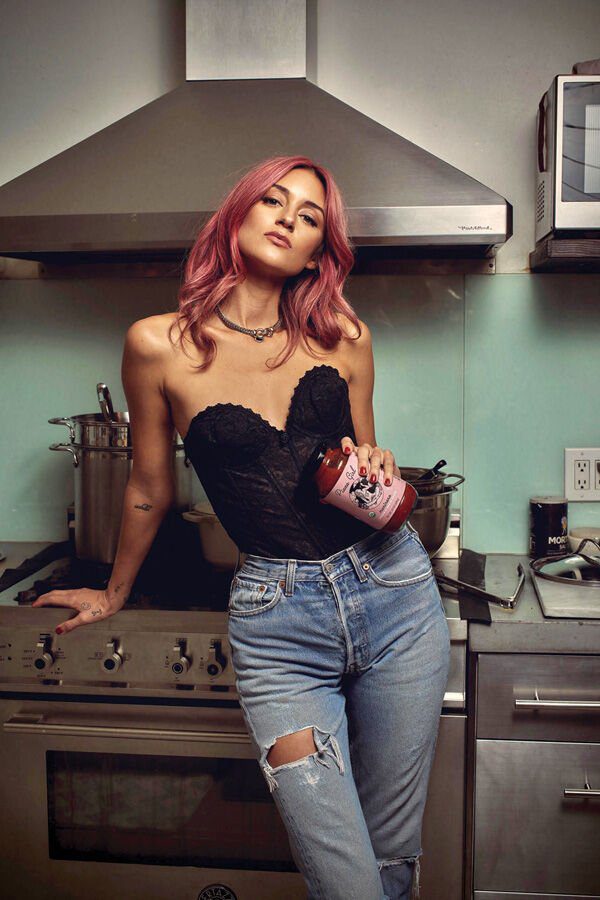Born and raised in Malibu, Caroline D’Amore has walked runways at New York Fashion Week, spent time on the LA “it girl” circuit during the glitzy 2000s, signed to a record label, got dropped by that label, opened a restaurant, lost that restaurant, launched an Italian foods company, lost everything, and started fresh again. Oh, and she’s also starred on a reality show and become a mother.
Through it all, she’s stuck to her roots in Malibu and her childhood nickname—pizza girl.
“Honestly, my dad kind of started the pizza girl nickname,” Caroline said. The businesswoman was referring to her father, Joe D’Amore, who has owned the local pizza restaurant chain D’Amore’s for decades.
In addition to steadily supplying Malibu with his signature Neapolitan pies, Joe D’Amore raised four daughters solo. The sisters’ mother passed away when Caroline was five, so Joe often took his little girls along to his catering gigs, Caroline explained.
“The only option was to make it cute, so he put us in shirts that said ‘Pizza Kids’ and we helped serve at functions in Malibu,” Caroline recalled. “As I got older and went to Malibu High, people remembered … When I’d show up at a party, they’d kind of endearingly make fun of me, like, ‘Oh, where’s the pizza at?’” she laughed.
But as a teenager, she wasn’t laughing. She actually found the “Pizza Girl” nickname quite annoying, she said, and rebelled against it. “I wanted to be anything but that, so I went off—and also, when you don’t have a mom, you end up on your own at times—and became a bit of a party girl,” she said.
Caroline began hanging out with Paris Hilton and Nicole (Caroline referred to her as “Nikki”) Richie—right at the height of the 2000s, when paparazzi crawled Los Angeles and gossip blogs plastered photos of fallen-from-grace celebrities across the nascent internet.
Caroline found herself in the middle of it all, a Malibu kid without the “Malibu wealth.” She turned to modeling and DJing: “anything to make money and go out—and then I would have to come back and deliver pizzas.” The media were quick to shellac her into “pizza heiress” (literally, a 2007 LA Times article about the then-23-year-old was titled “MODEL, DESIGNER, DJ, PIZZA HEIRESS”).
“We lived in [Malibu] because my dad opened a pizza restaurant there,” she explained, remembering her family’s tiny apartment on Las Flores Beach (which Caroline referred to by its old nickname, Dog Beach).
The D’Amore sisters were eventually kicked out of that oceanside apartment for throwing “the biggest parties they had ever seen on Dog Beach” when their father went out of town. Caroline went on to spend her 20s immersed in the glamour of the music and fashion industries, walking runways, gracing magazine covers and signing an ill fated record deal.
But in her 30s, Caroline became a mother and found her way back to the family business, launching her own D’Amore’s franchise, which she says she lost in a divorce.
So, Caroline started afresh once again. This time, she would own everything. She launched Pizza Girl, a pasta sauce brand, with no outside funding—and little experience in the food industry.
How does one find a farm to source tomatoes? How does one place their products into grocery stores? Caroline found one way to do it.
“I ended up getting into over 100 supermarkets just by walking in and talking to people. Erewhon was the first to say yes,” she remembered. “I walked into the one on Beverly and said, ‘Who do I have to talk to?’ The employees were like, ‘That’s not how this works,’” but told Caroline she could go upstairs. She waited in the office all day before finally getting to pitch her pasta sauce; when she did, the high-end grocery store agreed to stock her products in all five of their locations.
When the pandemic hit, bigger conglomerates monopolized all the organic farms’ produce.
“We sold out of every single jar of sauce in two days, during the big rush to the supermarkets. You think that’d be a good thing, but it was actually terrible because I was unable to source my ingredients.” With no funding, Caroline had to shut Pizza Girl down.
But if there’s one thing the Malibuite learned from her years spanning the fashion, music and food industries, it’s resilience. Caroline took six months to reorganize her company, find investors and a new factory, reformulate the sauces, and completely redo the branding. Plus, she landed a spot on MTV’s reboot of the reality show “The Hills;” Caroline’s season is airing now.
Pizza Girl is now stocked in Gelson’s. Caroline said she’s working on getting it into Vintage Grocers and is currently in talks with Whole Foods. Pizza Girl carries a classic marinara, a spicy arrabiata and a creamy vodka sauce.
Why just three? “There’s a funny thing about shelf space,” she said. “If you only have one product, you’re going to get lost on that shelf, but I also didn’t want to have so many products because I feel like people who start companies can get really ahead of themselves.”
“It’s okay to be a company that starts small and develops the company really well and grows steadily,” she added.
Caroline’s father Joe loves the sauces.
“He was there with all the testing, giving stern opinions all the time,” Caroline said. She mentioned her younger sister Bonnie had just gone to the Gelson’s in Thousand Oaks and bought out the store’s supply of Caroline’s sauce to support her sister.
Pizza Girl is “definitely D’Amore approved,” Caroline said.




